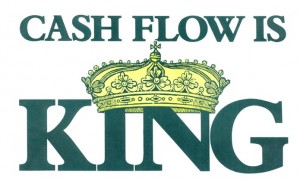(ThyBlackMan.com) With all the talk about the economy relative to the rich and the poor, tax inequity, disparities in employment, and high prices for the necessities of life, one very important consideration for Black people in the U.S. is cash flow – both individual and collective. Simply put, cash flow projections tell us how much cash is coming in and how much is going out. Good projections also allow us to get in front of an impending problem rather than having to react to it when it’s too late.
Businesses suffer when cash flow projections are improperly planned and “red flags” are not dealt with in a timely manner. Black folks are suffering because our cash flow is jacked–up, which means it continues in a negative mode rather than a positive one. We have much more going out than coming in, and that has resulted in our individual family net worth being less than $6,000 on average. And many of us have a negative net worth, which means even after we die, someone will have to continue to pay our bills.
In business, cash is king; unfortunately, that saying is not being applied in our neighborhoods and households, as we continue to outspend everyone else in this country, handing over our cash to any and every business we can find to support – that is, except our own. Cash is the life-blood of any community; if it flows through a community, via locally owned businesses, rather than out of a  community, via businesses whose owners live in another community, the result is good economic health for the community.
community, via businesses whose owners live in another community, the result is good economic health for the community.
It is unfortunate that, for the most part, Black folks only talk about “recycling” dollars while failing to actually implement the principle. But all is not gloom and doom; we still have time to change, and we do have a great deal of “disposable” income. Instead of “disposing” our nearly $1 trillion annual income among everyone else’s businesses, we must find ways to keep more of it among ourselves for a longer period of time. How can we accomplish that? Business development and business growth.
Entrepreneurship is the way out of our negative economic situation. Yes, we need to establish more businesses, but we must also grow those businesses to the point of being able to employ our people – our children. According to the last economic census, of the 1.9 million Black owned businesses in the U.S., only 106,500 have employees. And to add insult to injury, the number of those employees is a meager and embarrassing 909,000, all of whom are not Black.
If the vast majority of Black businesses continues to be sole proprietorships, our cash flow will stay on the negative side and our net worth will continue to be 20 times less than that of whites. If all we do is complain about being on the bottom, without kicking, scratching, and doing everything we can to move up economically as Malcolm, Garvey, Tony Brown, and many others have admonished us over and over, then we certainly deserve the negative result.
In order for Black cash flow to be positive, it must change its direction. Our dollars must start making more sense. Entrepreneurship is a major component of economic empowerment, thus, we must place more emphasis on it in our homes, our schools, our churches, and in our neighborhood circles.
Currently, Black cash flow projections are not looking positive at all. Our neighborhoods are in economic distress despite having significant cash on hand from week to week. However, as Michael Shuman noted in his book, Going Local (2000), “Being [classified as] poor doesn’t always mean being without resources. Anacostia is one of the poorest neighborhoods in Washington, D.C., yet the total income of all its households is $370 million per year. Most of this money quickly departs in the hands of landlords, business owners, and bankers who live in more upscale parts of town…The principal affliction of poor communities in the United States is not the absence of money, but its systematic exit.”
Stronger and larger local businesses, hiring local residents and family members, play a major role in economic empowerment. So too does owning the houses and apartment buildings in our neighborhoods, many of which are on the market at very low prices. These basic economic solutions go a long way toward keeping our cash flow positive and making our self-reliance a reality rather than some nebulous feel-good term we like to use once or twice a year.
Economics is local. If we teach entrepreneurship, start businesses, grow our businesses through support and mutually beneficial relationships, and own the real estate, our neighborhoods will become genuine communities once again.
Written By James E. Clingman
Official website; http://www.blackonomics.com/

















Another quality article, Mr. Clingman — keep up the great work!
Great article… You layed it out for anybody to understand. This is a must read. Keep putting the word out there Brother.